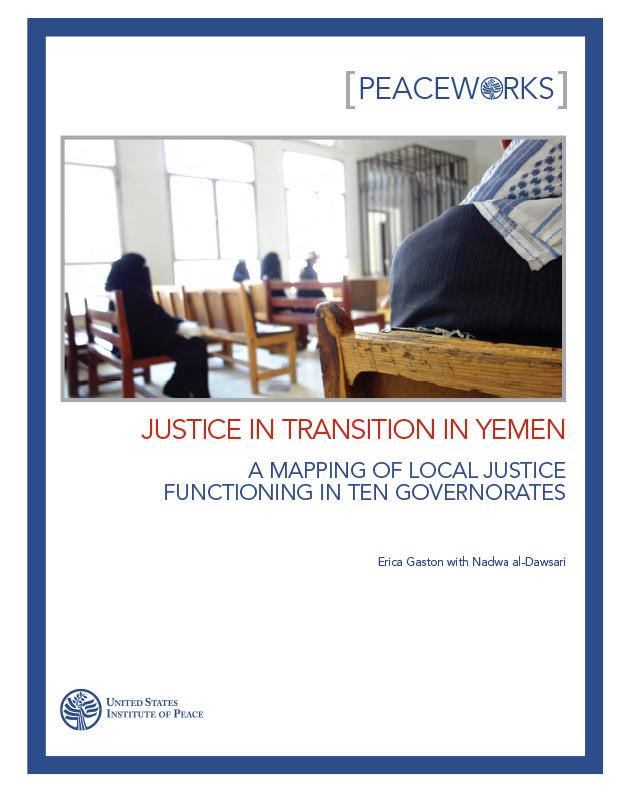A Mapping of Local Justice Functioning in Ten Governorates in Yemen
This research is part of a three-year United States Institute of Peace (USIP) project that explores how Yemen’s rule of law and local justice and security issues have been affected in the post-Arab Spring transition period. A complement to other analytical and thematic pieces, this large-scale mapping provides data on factors influencing justice provision in half of Yemen’s governorates. Its goal is to support more responsive programming and justice sector reform. Field research was managed by Partners-Yemen, an affiliate of Partners for Democratic Change.
Summary
- The political crisis and subsequent transition period triggered by the 2011 Arab Spring protests have severely strained already flawed judicial institutions in Yemen.
- The overall political uncertainty and the frailty of the divided transitional government have eroded state control and weakened rule of law in all areas. As a result, justice institutions have struggled to provide services at even the modest levels that existed in 2010.
- Courts have been shuttered or obstructed in carrying out normal functions because of general insecurity, direct threats against courts and judicial actors, and strikes and political disturbances. Citizens complain about increased corruption and poor performance of the judiciary and state impotence before increasing criminality, gangs, and armed groups.
- This research captures some of the challenges to justice delivery at a governorate level based on interviews with judicial actors and court observations in ten governorates across Yemen. In half of the ten governorates examined, there was little to no functioning judiciary at all. Even in the other five, many courts were closed 20 to 50 percent of the time in response to insecurity, political disturbances, strikes, or other factors.
- Until the larger political and security issues connected with transition are resolved, a full return to pre-2011 levels of functionality—much less improvements on those levels—will be difficult.
- Nonetheless, rule of law development targeted to the specific strengths and blockages in each governorate may address some of the immediate weaknesses. Such support might include protection for court facilities and personnel, greater transparency and public accountability over judicial case management, stronger monitoring and accountability for judicial actors, or, in some areas, infrastructure and equipment support.
- Investments in sustainable training and education mechanisms, including continuing legal education and practical job skills, may also help lay the groundwork for a stronger judiciary when the political turbulence subsides.
About the Report
This research is part of a three-year United States Institute of Peace (USIP) project that explores how Yemen’s rule of law and local justice and security issues have been affected in the post-Arab Spring transition period. A complement to other analytical and thematic pieces, this large-scale mapping provides data on factors influencing justice provision in half of Yemen’s governorates. Its goal is to support more responsive programming and justice sector reform. Field research was managed by Partners-Yemen, an affiliate of Partners for Democratic Change.
About the Authors
Erica Gaston is a human rights lawyer at USIP specializing in human rights and justice issues in conflict and postconflict environments. Nadwa al-Dawsari is an expert in Yemeni tribal conflicts and civil society development with Partners for Democratic Change.
